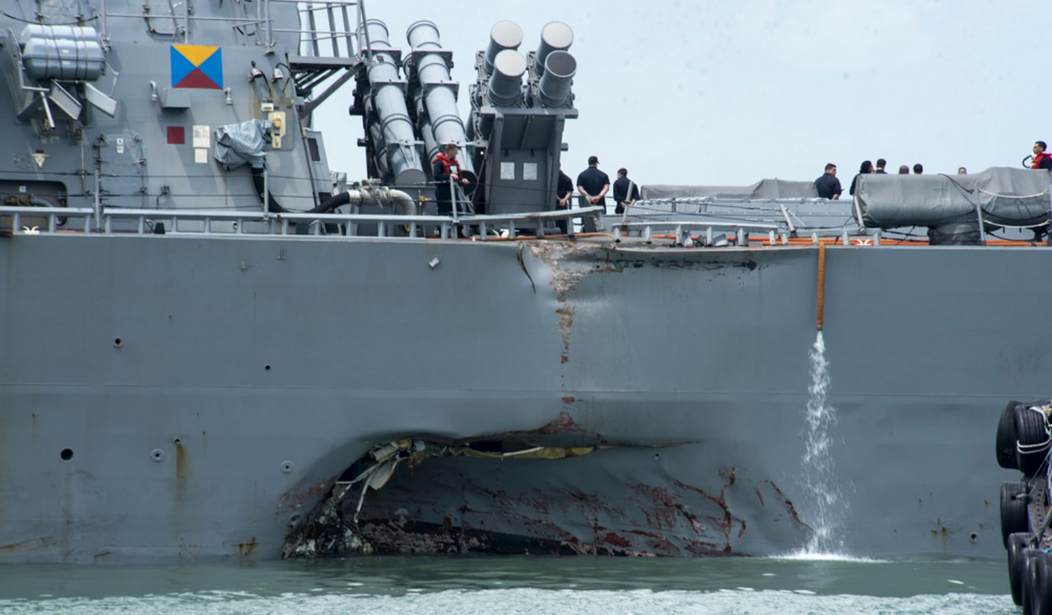WASHINGTON – While the Navy is increasingly being asked to do more with less, resulting in unprecedented degradation, four recent naval collisions are the result of command issues, Chief of Naval Operations Adm. John M. Richardson told Senate lawmakers Tuesday.
Richardson was responding to a line of questioning from Senate Armed Services Committee Chairman John McCain (R-Ariz.) concerning the impact of government funding through continuing resolutions, sequestration and automatic funding cuts. Secretary of the Navy Richard V. Spencer, who oversees the branch’s finances, told McCain that the impact of sequestration and CRs is “stunning” and “disturbing.”
Spencer explained plans for another potential continuing resolution, which would fund the government from Oct. 1 through Dec. 8. The fleet will mitigate an estimated $200 million shortfall for operation and maintenance over the next 60 days by incrementally funding or shortening periods of contracts where possible, which “will cause a degradation in the quality of work.” The Navy will also delay consumables and phased replacement work.
“This is not solely a funds issue, but you asked about CR and the effects of sequestration,” Spencer said. “We are living them. They are untenable.”
Richardson said that while CRs and sequestration “make everything harder,” the responsibility still falls on command. Before giving his reasoning, he explained that the Navy has been under constant pressure for the past nine years or so to do more with less.
“Having said that, sir, I maintain that this is an issue of command, and if you only give us one ship, it’s our obligation to operate that ship safely and effectively,” Richardson told McCain. “While that makes it harder, that is in no way an excuse for the performance that led to these four incidents.”
Among the incidents discussed was the USS Fitzgerald’s collision with a Philippine container ship near Tokyo in June, which resulted in seven deaths. The USS John S. McCain also collided with a Liberian ship off the coast of Singapore and Malaysia in August, which killed 10. Finally, the USS Antietam ran aground in shoals just outside the Yokosuka Naval Base in January, and the USS Lake Champlain collided with a South Korean fishing vessel in May (no injuries in either incident).
Before opening up questioning, McCain described a number of issues that have been detailed in Navy and GAO reports dating back to 2010: surface force degradation; a complicated chain of command on the waterfront; blurring lines of authority and accountability; a growing backlog for repairs; maintenance requirements not adequately identified or resourced; and limited training and maintenance of ship crews.
“Many of the issues that we’re discussing today have been known to Navy leaders for years,” McCain said.
“There is no explanation to reconcile those … observations,” Richardson said. “There has been an effort also to address those observations. We have not been sitting idle. While clearly it’s been insufficient to close the readiness and effectiveness gap, we have been making steady investments to respond to the indications that we’ve got in training and in manpower and in maintenance, and we’ll remain committed to closing that gap, as well.”
Recent efforts include a 60-day comprehensive review to examine training and professional development, among other issues, and a strategic readiness review, which will involve a team of outside experts to look at longer-term trends.
McCain lamented congressional gridlock in trying to address sequestration. While he said he’s proud that all 27 members of the committee supported the 2018 National Defense Authorization Act recently approved in the upper chamber, he blasted Democrats for blocking a recent attempt to repeal sequestration; Sen. Tom Cotton (R-Ark.) introduced the amendment.
McCain, “without naming names,” said that blocking the amendment from consideration of a vote was “disgraceful.”









Join the conversation as a VIP Member